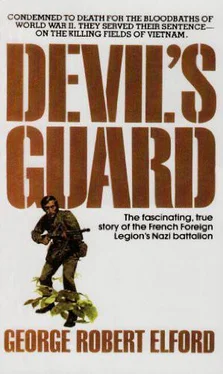Schulze challenged the commissar to take his place, if he had anything to say. “I have many things to say,” replied Kwang, “provided that you will permit me to speak without interrupting every second sentence.”
He cleared his throat and stepped forward, and when Sergeant Krebitz offered him a cup of fresh water, Kwang accepted it with a slight bow, drank slowly, as though he was weighing his coming words before speaking them; then he returned the cup and spoke.
“The colonialist officers are entertaining themselves with their own bourgeois propaganda, thinking that the Vietnamese people are deaf and blind, and cannot see beyond their hollow words, which contain much hatred, but not a spark of truth. This young man here,” he pointed at Schulze, “who very likely came from a wealthy family and has never known poverty, is a member of the army which burns your villages and murders your brothers and sisters. He was probably tired of killing, at least for a few hours, so he conceived this mock trial of Communism, which he calls a free discussion. He may be thirty years old, yet nevertheless he tries to prove to us that he knows more than Lenin, Stalin, Comrade Mao, and Father Ho ever managed to learn. He has been in this country for only a few years, but he wants to guide your village elders; he wants to prove that Father Ho speaks empty words. He tries to ridicule the Soviet people whom we may thank for the greatest gift of mankind—our freedom from slavery. There are some facts which the colonialist officer seems to ignore. The Soviet people have achieved many things which are very difficult to dismiss with a barrage of empty words and wicked lies. He also tries to blame our Comrade Mao for not having built more in two years than the rich capitalist nations built in centuries. In twenty years time the Russian people had built a wonderful new nation but then the capitalists, the country of this officer here, Germany, invaded the Soviet Union and destroyed everything the people had built.”
Kwang spoke slowly and with dignity, carefully selecting his words. Schulze did not interrupt him. Kwang spoke for a long time, about the new towns and villages, about the schools, hospitals, roads, and industries which the Russians had built, and which the Chinese people were endeavoring to build now. He spoke of the “largest” power-generating system in the world, the Volga-Don canal, that was to bring electricity to the remotest villages. Obviously he could not recall many glorious deeds from Mao’s China for he kept repeating that Russia did this and Russia did that, citing only Soviet examples. He spoke for the better part of an hour and I felt terribly bored. Then mercifully he concluded his polemic with the eloquent slogan: “The Soviet people, with Comrade Stalin to lead them, has accomplished the impossible.”
“It is true that Stalin accomplished the impossible,” Schulze picked up where Kwang had left off. “Stalin moves mountains and builds an artificial sea as big as your country, the commissar said. But he forgot to mention that Stalin has six million slaves to work for him without pay. When Stalin needs a hundred thousand more workmen, he just gives the word to the Secret Police to increase the weekly output—or should we say input—and soon the enemies of the people are picking up the shovels. When Stalin tells the Russian worker: Ivan, from now on you will work twelve hours every day, Ivan will work twelve hours every day. If Stalin said the same thing to a worker in my country, or in any free country, he would be given a shovel and told, “Do it yourself, Josip.”
” Another wave of laughter followed the translation. Schulze waited patiently for a while, then went on. “This is how Stalin is building the Soviet paradise and this is how Mao Tse-tung is going to build his own empire. The rich people, the exploiters, the slave drivers will no longer be called landlords, mandarins, moneylenders; they will be called party secretaries, commissars, district propagandists, and militiamen. But you people will be toiling harder than you are toiling now.”
He turned and walked up to the two propagandists. “When we began to talk, Commissar Kwang said that we were going to shoot him at the end. You should not believe us, he said. I am saying now that you are free to believe whatever you want and we are not going to shoot these Communist liars either. They aren’t worth the cost of the bullets.”
He grabbed the prisoners by their arms and led them through the ring of people who silently moved aside. Reaching the road he gave them a gentle slap on the back and shoved them forward.
“Go, Commissar Kwang and Propagandist Kly, Fool more people—for the more people you fool, the sooner will the people see you for what you are: cheats, arrogant liars, remorseless killers… traitors to your own country, traitors to mankind. You are guilty as sin but we are doing something you would never do to innocent people-—we let you go. You are free men. Go!” We departed shortly before sundown. What impression we left behind we never learned. But if we left an impression, I felt it was not an adverse one.
Two months later the Viet Minh executed thirty people in that village.
“The poor devils,” Pfirstenhammer remarked, when we received the news of the massacre. “They must have remembered some of Erich’s arguments and dared to repeat them openly.”
13. THOSE INNOCENT NONCOMBATANTS
A group of villagers, some of them women, working in the paddies—a familiar spectacle as peaceful as it is picturesque… A painter of rural scenery would be overjoyed at the eye-catching sequence: the white-clad figures in the knee-deep, shimmering pond; the sun rising above the green jungle background; a pair of water buffalo squatting in the mire, only their horns and noses visible; a low wooden hut roofed with palm fronds and erected on piles to provide the workers with a shelter against a sudden downpour. It was a spectacle that we beheld almost daily during our dreary years in Indochina; a spectacle very tranquil—outwardly so—and ready to lull the inexperienced soldier into a false belief of security.
It happened once at the beginning of our service that a similar group of unaggressive villagers had greeted our reconnaissance patrol in the most cordial manner and offered the troops fruits, cane sugar, and cooked rice with curried fish in exchange for salt and tobacco. After some friendly bargaining a deal was struck and the platoon invited to share a modest meal with the natives in their village. The platoon leader sergeant (a veteran of the Russian campaign but still a greenhorn in Indochina) gladly obliged.
Twenty-two cheerful troopers entered the village—a skillfully camouflaged Viet Minh stronghold. Only six of them escaped the trap. The rest of the platoon had to stay behind, no longer as guests but as bullet-ridden corpses, among them the trusting sergeant.
It happened to us once. Once! Afterwards, whenever we encountered a single peasant in a rural trail, we always considered him a potential Viet Minh observer. The alternative that he might be a genuine noncombatant came afterwards. We would check such an individual and if nothing incriminating was found on or about his person he would be allowed to proceed—with a couple of our marksmen trailing him secretly for at least a mile.
Sometimes the traveler would continue on his way as leisurely as before; sometimes the man would hurry up the moment he thought he was safely out of sight and rifle range—most likely to notify the nearest guerrilla cell. Speed meant urgency and for urgency we had but one interpretation: The Viet Minh must be informed of our presence in the neighborhood. If a man speeded up after our checking, then he would die.
When we emerged from the woods the peasants showed no concern. They only glanced up, then went on with their work; their conical straw hats concealed whatever emotion their faces might have shown. No one could tell if they were friendly, neutral, or hostile, but we were not interested in their political sentiments—only in such material possessions as illegal firearms. We learned long ago not to bestow too much confidence on the natives. Boys of sixteen, sixty-year-old matrons, Buddhist monks, or French-nominated administrative officials we regarded with equal skepticism.
Читать дальше












